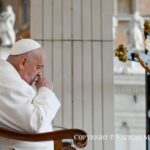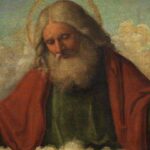Tempo di lettura: 11 minuti
Read the meaning and history of the Solemnity of Pentecost
Summary
Meaning
Pentecost(inancient Greek: πεντηκοστή [ἡμέρα],pentecost [hēméra], i.e. “fiftieth [day]”) is onefeast Christianin which the outpouring of the is celebratedHoly Spirit, gift ofJesusand the birth ofChurch.
It falls on the fiftieth day from the day ofEasterincluding (hence the name), ofSunday, i.e. at the end of the seventh week after Easter, and is therefore onemoveable partydepending on the date of Easter. Above all, it celebrates the beginning of the harvest, then as a second meaning the gift of the law is celebrated.
Pentecostit is also the ancient Greek name of the holidayJewishofShavuot, which represents a Thanksgiving holiday.
(source Wikipedia)
Jewish holiday
Originally a Jewish holiday to celebrate the beginning of the harvest which fell 50 days after the Easter Jewish, thePentecost è diventata per il Cristianesimo una delle solennità più importanti, in cui si ricorda il momento in cui lo Spirito Santo discese su Maria e sugli apostoli riuniti nel Cenacolo. Questo evento segna per la Chiesa il vero atto di nascita d’inizio missionario.
Digging into the Jewish origin, Pentecost really means50th day. Si trattava di una festa di pellegrinaggio (verso Gerusalemme) per ringraziare Dio dei frutti donati alla terra, a cui in seguito si aggiunse anche la commemorazione del più grande dono che Dio fece agli ebrei: la proclamazione delle leggi divine sul Monte Sinai.
As early as the fourth century, Pentecost had also become a feast for Christians, but in honor of the Holy Spirit, in which Baptism was bestowed on those who had not been able to receive it during the Easter vigil.
from the Acts of the Apostles
The account of the descent of the Holy Spirit upon Mary and the apostles is found in the Acts of the Apostles (chapter 2):
As the day of Pentecost was about to end, they were all together in the same place. Suddenly a roar came from the sky, like a strong wind blowing and filled the whole house where they were.
Tongues of fire appeared to them, which divided and rested on each of them; and they were all filled with the Holy Spirit and began to speak in other tongues, as the Spirit gave them utterance.
There were then in Jerusalem devout Jews, from every nation under heaven. When that noise came, the crowd gathered and were amazed, because each one heard them speaking in their own language. They were amazed and, beside themselves with astonishment, they said: “Aren't these who speak all Galileans? And how is it that we each hear them speaking our native tongue?”
Holy Spirit
As a "third person" of the Holy Trinity, IHoly Spirit è il principio di unificazione della Chiesa e della santificazione dei fedeli. Rappresentato nel Vecchio Testamento come forza divina in grado di produrre la naturale vita cosmica ed elargire doni miracolosi e profetici, mentre nel Nuovo Testamento è spesso una forza carismatica.
The Holy Spirit is also the foundation of equal dignity for all believers, which is bestowed during baptism, through the granting of hissacred you give.
I doni dello Spirito Santo sono (stando all’insegnamento tradizionale di Isaia): consiglio, intelletto, fortezza, pietà, sapienza, scienza e timore di Dio. Tali doni sono poi confermati con il sacramento della Cresima.
Rarely depicted in human form, the Holy Spirit comesrepresentedin many works and writings as a luminous cloud, infused with divine grace, like a pure white dove, but also as fire, an ancient symbol of life and death.
The Holy Spirit comesinvoked in diverse occasioni liturgiche, tra cui il Battesimo e la Cresima, o la solenne liturgia nell’Ordine Sacro, ma anche nelle occasioni più importanti, quali l’apertura del Conclave per un’elezione papale. Tutte occasioni in cui si invoca ed implora l’aiuto divino per poter percorre il sentieri migliore per un buon cristiano.
source Vatican.com
Solemnity of Pentecost

La solennità della Pentecoste viene celebrata 50 giorni dopo la Pasqua: festa durante la quale si fa memoria del dono dello Spirito Santo, che va a colmare la confusione di Babele (cfr Gn 11): in Gesù, morto, risorto e asceso al Cielo, i popoli tornano a comprendersi nell’unica lingua, quella dell’amore.
Nella prima metà del III secolo già Tertulliano e Origene parlano della Pentecoste come di una festa che segue quella dell’Ascensione. Nel IV secolo la Pentecoste è una festa già comunemente celebrata a Gerusalemme, come ricorda la pellegrina Egeria, e propone il tema del rinnovamento che la venuta dello Spirito ha operato nel cuore degli uomini.
La Pentecoste affonda le sue radici nel popolo ebraico, con la festa delle Settimane: una ricorrenza di origini agricole in cui si esaltavano le primizie della mietitura e si festeggiava il raccolto dell’anno. Successivamente, gli ebrei ricordarono la rivelazione di Dio a Mosè sul Monte Sinai con il dono delle Tavole della Legge, i Dieci Comandamenti.
Quindi per i cristiani diventa il momento in cui Cristo, tornato alla gloria del Padre, si fa presente nel cuore dell’uomo attraverso lo Spirito, legge donata da Dio, scritta nei cuori: “L’Alleanza nuova e definitiva è fondata non più su una legge scritta su tavole di pietra, ma sull’azione dello Spirito di Dio che fa nuove tutte le cose e si incide in cuori di carne” (Papa Francesco, Udienza generale del 19 giugno 2019). A cominciare dalla Pentecoste, ha inizio la Chiesa e si da avvio alla sua missione evangelizzatrice.
“Mentre il giorno di Pentecoste stava per finire, si trovavano tutti insieme nello stesso luogo. Venne all’improvviso dal cielo un rombo, come di vento che si abbatte gagliardo, e riempì tutta la casa dove si trovavano.
Tongues appeared to them as of fire which divided and rested on each of them; and they were all filled with the Holy Spirit and began to speak in other tongues as the Spirit gave them power to speak”. (Acts 2, 1-4)
Church time
Il tempo di Pasqua non si è concluso con la solennità dell’Ascensione, ma si conclude oggi, con la solennità della Pentecoste, giorno in cui il Signore manda lo Spirito Santo sui discepoli. E’ questo dono che rende capaci di andare “fino agli estremi confini della terra” per dare testimonianza a Gesù (cfr domenica scorsa, At 1,17). Potremmo dire che è proprio con la Pentecoste che ha inizio la nostra Ascensione verso il Padre.
A "too much" to welcome and understand
Il Vangelo della Liturgia di oggi (Gv 15, 26-27; 16, 12-15) ci dice qualcosa dell’opera dello Spirito in noi. Gesù parla a lungo con i suoi discepoli prima della sua passione, e ad un certo punto afferma di avere tante altre cose ancora da dire; ma aggiunge che per ora i discepoli “non sono in grado di portarne il peso” (Gv 16,12).
C’è un “troppo” di cui non siamo in grado di portarne il peso. C’è qualcosa che non possiamo ottenere solo con la nostra intelligenza, con le nostre ricchezze, tanto meno con il potere, con l’uso della forza.
Lo Spirito è esattamente Colui che ci rende capaci di vivere una vita all’altezza del dono di Dio; ci rende capaci di questo “troppo”, di questo di più. Arriva proprio dove noi, da soli, non possiamo. E lo fa dal di dentro: non imponendoci un peso ulteriore, non chiedendoci uno sforzo in più. Ci conduce alla verità, che non è un’idea, ma Gesù stesso, il quale ci educa a farci piccoli, poveri per imparare a fare spazio a Dio e agli altri.
In fondo, la Pentecoste è proprio la festa della fraternità, della comprensione, della comunione. Se con la Torre di Babele (cfr Gn 11) gli uomini hanno tentato di costruirsi la loro autonomia, alla fine si sono accorti che si stavano costruendo l’uno contro l’altro, in quanto non avevano più la capacità di accordarsi, di capirsi.
Demonstrating that progress or the multiplication of means of communication if on the one hand makes us more autonomous, on the other hand it is revealing how much difficulty there is in understanding each other due to the distrust that all this instills in hearts and minds. The Holy Spirit is that "medicine" which makes it possible to speak in new languages because it is the only gift capable of creating new hearts.
source Vaticannews.va
Homily by Pope Benedict XVI
(Sunday, June 4, 2006)
Dear brothers and sisters!
Il giorno di Pentecoste lo Spirito Santo scese con potenza sugli Apostoli; ebbe così inizio la missione della Chiesa nel mondo. Gesù stesso aveva preparato gli Undici a questa missione apparendo loro più volte dopo la sua risurrezione (cfr At 1,3).
Before the ascension to Heaven, he ordered to“non allontanarsi da Gerusalemme, ma di attendere che si adempisse la promessa del Padre”(cfAt1,4-5); that is, he asked whatthey stayed togetherto prepare to receive the gift of the Holy Ghost. And they gathered in prayer with Mary in the Upper Room in anticipation of the promised event (cfAt1.14).
Restare insieme fu la condizione posta da Gesù per accogliere il dono dello Spirito Santo; presupposto della loro concordia fu una prolungata preghiera. Troviamo in tal modo delineata una formidabile lezione per ogni comunità cristiana. Si pensa talora che l’efficacia missionaria dipenda principalmente da un’attenta programmazione e dalla successiva intelligente messa in opera mediante un impegno concreto.
Certo, il Signore chiede la nostra collaborazione, ma prima di qualsiasi nostra risposta è necessaria la sua iniziativa: è il suo Spirito il vero protagonista della Chiesa. Le radici del nostro essere e del nostro agire stanno nel silenzio sapiente e provvido di Dio.
Le immagini che usa san Luca per indicare l’irrompere dello Spirito Santo – il vento e il fuoco – ricordano il Sinai, dove Dio si era rivelato al popolo di Israele e gli aveva concesso la sua alleanza (cfr Ex19,3ff). The feast of Sinai, which Israel celebrated fifty days after the Passover, was thereFeast of the Covenant.
Speaking of tongues of fire (cfAt2,3), Saint Luke wants to represent Pentecost as a new Sinai, like theFeast of the New Covenant, in cui l’Alleanza con Israele è estesa a tutti i popoli della Terra. La Chiesa è cattolica e missionaria fin dal suo nascere.
The universality of salvation is significantly highlighted by the list of numerous ethnic groups to which those who hear the first announcement of the Apostles belong:“Siamo Parti, Medi, Elamìti e abitanti della Mesopotamia, della Giudea, della Cappadòcia, del Ponto e dell’Asia, della Frigia e della Panfilia, dell’Egitto e delle parti della Libia vicino a Cirène, stranieri di Roma, Ebrei e prosèliti, Cretesi e Arabi e li udiamo annunziare nelle nostre lingue le grandi opere di Dio”(Acts 2,9-11).
Il Popolo di Dio, che aveva trovato al Sinai la sua prima configurazione, viene quest’oggi ampliato fino a non conoscere più alcuna frontiera né di razza, né di cultura, né di spazio né di tempo.
Unlike what had happened with the tower of Babel (cfGn11,1-9), when men, intending to build a way to heaven with their own hands, had ended up destroying their own ability to understand each other, on Pentecost the Spirit, with the gift of tongues, shows that the his presence unites and transforms theconfusioninCommunion.
Man's pride and selfishness always create divisions, build walls of indifference, hatred and violence. The Holy Spiriton the contrary, it makes hearts capable of understanding everyone's languages, because it re-establishes the bridge of authentic communication between Earth and Heaven. The Holy Spirit is Love.
Ma come entrare nel mistero dello Spirito Santo, come comprendere il segreto dell’Amore? La pagina evangelica ci conduce oggi nel Cenacolo dove, terminata l’ultima Cena, un senso di smarrimento rende tristi gli Apostoli.
La ragione è che le parole di Gesù suscitano interrogativi inquietanti: Egli parla dell’odio del mondo verso di Lui e verso i suoi, parla di una sua misteriosa dipartita e ci sono molte altre cose ancora da dire, ma per il momento gli Apostoli non sono in grado di portarne il peso (cfr Jn 16,12).
Per confortarli spiega il significato del suo distacco: se ne andrà, ma tornerà; nel frattempo non li abbandonerà, non li lascerà orfani. Manderà il Consolatore, lo Spirito del Padre, e sarà lo Spirito a far conoscere che l’opera di Cristo è opera di amore: amore di Lui che si è offerto, amore del Padre che lo ha dato.
Questo è il mistero della Pentecoste: lo Spirito Santo illumina lo spirito umano e, rivelando Cristo crocifisso e risorto, indica la via per diventare più simili a Lui, essere cioè “espressione e strumento dell’amore che da Lui promana”(Deus caritas est, 33).
Raccolta con Maria, come al suo nascere, la Chiesa quest’oggi prega: “Vieni, Spirito Santo, riempi i cuori dei tuoi fedeli e accendi in essi il fuoco del tuo amore!”. Amen.
source gospeloftheday.org





